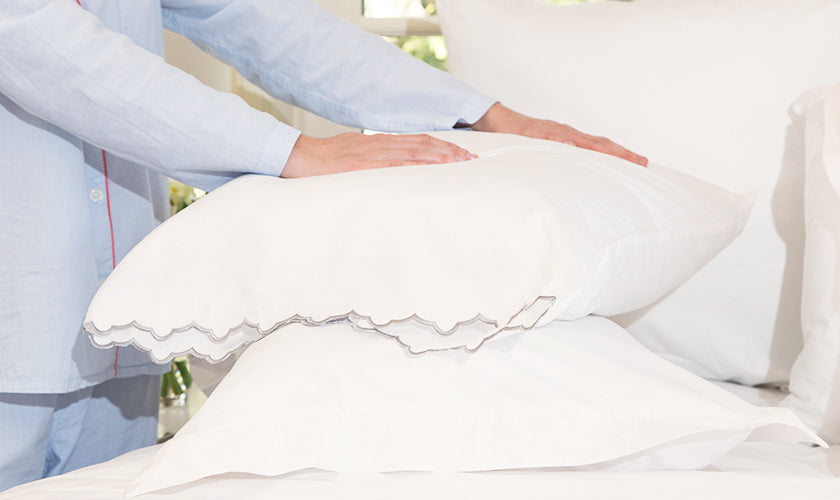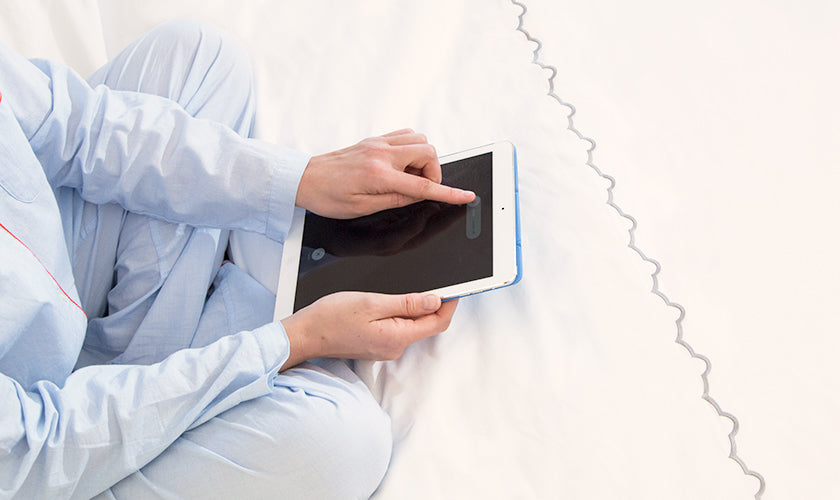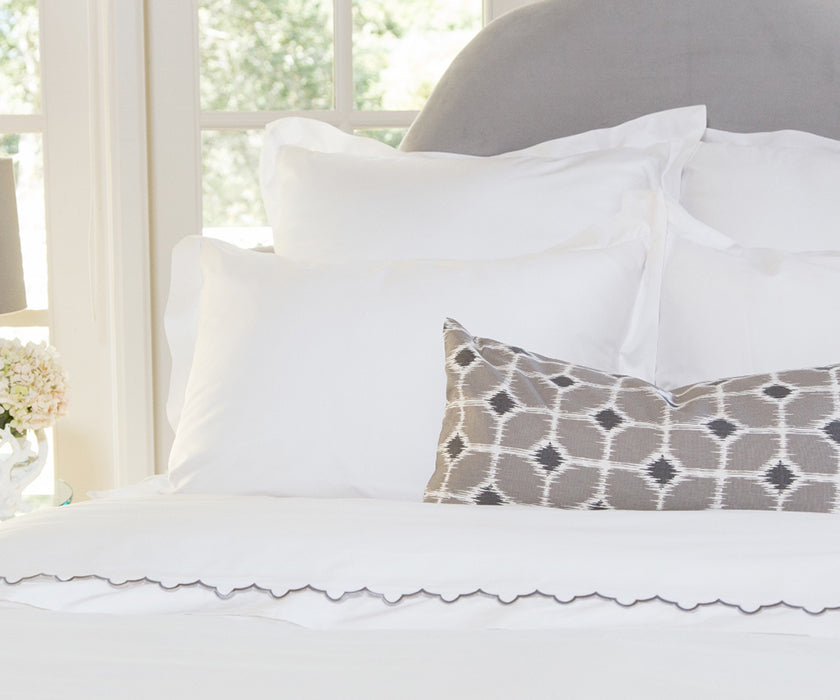HOW TO SLEEP BETTER: 10 TIPS TO GETTING A GREAT NIGHT'S SLEEP
Sleep plays a vital role in our overall physical health and mental well-being. Sleep allows our brains to recharge, store information and get ready for the next day’s events. More than half of Americans are not getting a good night’s sleep consistently. According to a National Sleep Foundation survey, only 4 out of 10 respondents said they get a good night’s sleep every night or almost every night. Additionally, the National Institute of Health estimates that 1 in 3 adults suffer from occasional bouts of insomnia. That’s a lot of people not getting the sleep they need.
Here are 10 tips and a video on how to sleep better tonight and every night!
-
1. Evaluate what you're sleeping on. Sleeping with the correct bedding, mattress and pillows for your sleep style will help you get better sleep. When it comes to purchasing luxury bedding, we have one golden rule: buy the best you can afford. We spend 1/3 of our lives in bed, so you might as well make it the best it can be. When shopping for new sheets and duvet covers, pay close attention to the material, thread count and fabric construction. For the most luxurious feel, we recommend bedding made from 100% cotton in a thread count between 300 and 400 with a single-pick single-ply sateen weave.
Are you a back or stomach sleeper? You will want a mattress that is on the firm side and a pillow that is thin and flat. This same rule applies to anyone suffering from back pain.
Are you a side sleeper? Many side sleepers find that a firm mattress provides discomfort to the hips and shoulders. Try sleeping on a softer surface with a firm pillow that perfectly props your head and aligns the spine.
- 2. Detox your sleep environment. It’s true. A clean room will help you sleep better. Those who make their beds every day are 20% more likely to get a good night’s sleep than those who do not make their beds. It’s also important to wash your sheets every week. Sleeping with clean and fresh sheets leads to a better night’s sleep
- 3. Exercise regularly to sleep better. In 2013, the National Sleep Foundation found that regular, vigorous exercisers reported getting better sleep. Vigorous, moderate and light exercisers are 20% more likely to receive a good night’s sleep than non-exercisers. Furthermore, about one-half (51%) perceive their sleep quality to improve on days they exercise. Even a quick 15 minute workout or walk can make a big difference in your sleep schedule. Ideally, exercising 30 minutes 3-4 times per week will help you fall asleep faster and get better quality sleep every night. Be warned: exercising a couple hours before bedtime should be avoided. It will actually make you feel more alert and less ready for bed.
- 4. Keep it cool in the bedroom. A bedroom that is too hot or too cold will wake you up and make it hard to fall back asleep. Sleep experts recommend keeping the bedroom at a moderate 60 to 67 degrees Fahrenheit. Keep your bedroom cool, but keep it nice and warm under the sheets. Having warm extremities (hands and feet) actually predicts how quickly one can fall asleep. If you tend to run cold, try slipping on a pair of socks before diving in to bed. It just might help you sleep better at night.
- 5. Power down. We live in the digital age and are surrounded by screens from sun up to sun down. Bright lights trigger the brain into thinking it is time to be awake and alert. All screens (smartphones, TVs, laptops, tablets, etc) belong outside the bedroom. To read your mind for sleep, we recommend dimming all lights and powering down your devices 60-90 minutes before bedtime. You will thank yourself in the morning.

- 6. Create a wind-down routine. We all have a few things we do before we go to bed. Create a routine that will prepare you mentally for sleep. Maybe start with a warm cup of caffeine-free tea, take a bath, or empty your mind by writing out thoughts and to do’s for the following day and end with brushing your teeth and washing your face. Reading a real book will also tire your eyes. Your wind-down routine will trigger the mind for sleep.
- 7. Be caffeine-free 6 hours before bed. Sometimes a cup of joe is all you need to make it through the afternoon lull. Be warned! Caffeine consumed 5-6 hours before bed has been proven to affect your sleep. Try skipping the PM caffeine. When you do, you might notice yourself falling asleep faster.
- 8. Go easy on booze and big meals before bed. Your body is not meant to digest heavy meals while you sleep. If you have to eat a late meal, choose something light that won’t weigh you down. Keep in mind that protein is especially difficult to digest. The same goes for alcohol. While a lot of alcohol might help put you to sleep, drinking too much will actually cause you to wake up during the night once the buzz wears off and your body starts processing the alcohol.
- 9. Resist the urge to snooze. We are all guilty of it. Sleep caught between alarm soundings is not high-quality sleep. Many snoozers tend to feel groggier or more tired because their REM sleep has been disrupted by multiple alarms. Skip the snooze cycle by setting your alarm a bit later and do your best to rise shortly after.
- 10. There is nothing better than your own bed. While sleeping in a luxury hotel room is exciting and glamorous, you are often not getting the best night’s sleep possible. According to the National Sleep Foundation, 6 out of 10 Americans said that their pillows, mattresses and bedding were better in their own bedroom than in a quality hotel room.
-
Getting more and better sleep is one of the simplest and best things you can do to prevent sicknesses, manage stress and increase your daily productivity. Better sleep will also improve your memory, put you in a better mood and strengthen your immune system. We hope that with these 10 tips, you will get the best quality sleep, every night. Sleep better tonight and sweet dreams!

